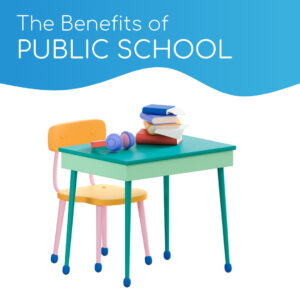Five Benefits of Public Schools
 This blog is the first in a three-part series exploring the pros and cons of different schooling options for your child. You can also listen to Melissa and Lindi discuss this topic on this week’s podcast! Click here to listen.
This blog is the first in a three-part series exploring the pros and cons of different schooling options for your child. You can also listen to Melissa and Lindi discuss this topic on this week’s podcast! Click here to listen.
Choosing the right place for your little one to experience all that education has to offer is one of the biggest decisions you’ll make! But how do you know what is right for your family?
This series will explore the benefits of public schools, private schools, and homeschooling to help you better understand the benefits of each, so you can make a confident, informed decision for your child’s education. We will begin by highlighting the benefits of utilizing your local public school system, and in coming posts, we will explore other options to give you a full understanding of what each choice could mean for you and your family.
Five benefits of choosing public school:
Cost. According to US News & World Report, the average tuition for private elementary school in the United States in 2022 was $12,350. Public school is paid for by your tax dollars, whether you utilize them or not. So, even if you choose private school or homeschool for your child, you are still contributing to your local public school system. Why not reap the benefits as well? There is no additional cost to enroll in public school, and for a family on a budget, this can be a huge factor in the decision-making process.
Accountability. Public schools are held to a standard by the state in which you reside. While standardized testing has its pros and cons, it is comforting to know that your child’s school is being held to a standard by a higher authority! Not only that, but public school teachers are required not only to be certified but also to keep their certification current and renew when necessary. By contrast, private schools and charter schools do not always require certified teachers, meaning that parents may or may not know what level of training a teacher has completed.
Services and Extracurriculars. By law, public schools are required to offer certain services to students. Some of these include transportation to and from school, special education teachers, learning specialists, and free or reduced-priced lunch for families who qualify. While private schools are not required to accommodate learning differences, public schools are required to provide a quality education to all students, regardless of their ability. Not only that, but public schools often offer a variety of extracurricular activities at little or no cost to parents, such as athletics, music classes, art, and more!
Diversity. Attending a local public school ensures that your child will encounter children from many other backgrounds, cultures, and income levels. Not only that, but because public schools are also required to offer special education accommodations, your child will have the opportunity to work closely with mentally and/or physically disabled students. Diversity is important for children as they learn about the world around them, and being in a school environment where they will interact daily with people who may be different from them can help your child to develop into a more empathetic, understanding, and open-minded individual.
Academic Opportunities. Public schools often offer advanced and alternative education opportunities that won’t cost extra but will give your child a leg up on their future. Many districts offer specialty schools for technology, arts, and other interests, and the International Baccalaureate Program and Advanced Placement programs are typically available to students in public schools. These programs allow students to explore their interests, dive deeper into them, and be challenged academically.
Choosing the right place for your child’s education is a significant decision that parents take seriously. While public schools have their share of issues, the opportunities, accessibility, and diversity make public schools a wonderful place for children to receive their education.
